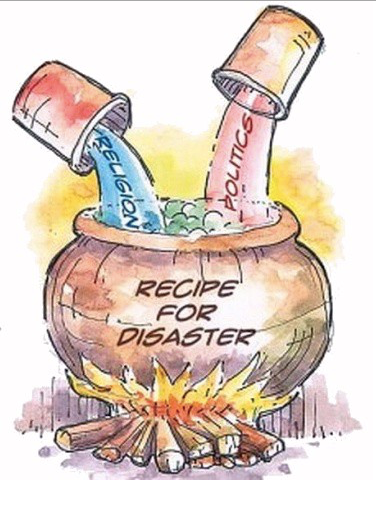By: Arminta Rokeb
Our ancestors worshipped anything they believed provided logical reasoning to celestial phenomena. For centuries, humankind has depended on their faith in God(s), or another form of a higher power, to pursue a civil life. Religion became a method to appease these higher powers and enrich their lives with prosperity. Thus, priests and religious figures became the most prominent members in various societies, as they were a liaison between their God(s) and the common man. Eventually, it gave rise to governments and the establishment of civilization with politics and justice.
However, this practice has outdated itself, as our society has evolved over time. The emergence of science and research contributes to the formation of atheists and non-religious individuals. Similarly, migration of communities in masses helped develop a diverse society, where people with different religions interacted freely. In this aspect, it would seem that mixing faith and state is fundamentally antithetical to the possibility of establishing a peaceful, and more importantly, free nation.
Yet, religion has been rooted in governance throughout history. Though it's magnitude varies, this method has stemmed into conflicts and has repeatedly failed to consolidate power. Notable examples include Hitler’s Holocaust and the Iran-Iraq War, amongst many others. These movements aimed to aid the establishment of a totalitarian state, therefore, when religion interferes in politics, it is quite probable that casualties follow, including those wounded as a result of the forced disciplines in these ‘democracies’.
In a secular democracy, theocracy abuses one’s right to freedom. Countries which proclaim themselves secular in nature, are bound to face backlash when the government appears more sympathetic to any given belief system. When citizens witness partiality, it meddles with the prospect of freedom, as the government has conveniently favoured another. This is because religion dictates a certain exclusiveness, that politicians often turn a blind eye to, and this, in turn, tampers with one might consider as ‘civil society’.
Additionally, religious intolerance may be considered one of the most significant sources of violence in today's world. The intolerance stems from the fact that the world is a secular place, and the government of any given country has no right to impose a religion that would dominate, and henceforth cause conflicts within society, as it inadvertently it collides with one’s basic rights and freedoms.
Furthermore, religion is based on beliefs, which are subject to varying interpretations, and thus can only be loosely applied. Some nations may use religion to remedy social disparities and then tweak their interpretation, as per their need. Religion lacks a concrete system and is not grounded in truth and evidence, that is required within a government and their ability to justly rule. Many politicians use it as an antidote and seek solace in our troubled world. Though policymakers may use religion as a backbone to control their nation, the minorities are neither heard or attended to, which is an indirect form of suppression and oppression.
Although it is understandable why politicians and governors use religion, as it not only helps them to connect with their citizens, it also aids their ability to relate to their subjects. It is a key tactic in campaigning for positions in an electoral government, and helps candidates with similar beliefs to appease a majority of a nation. Hence, citizens may disregard candidates with other faiths. In today's parliaments, secular countries lack representation from varied religions, and thus, religion again becomes a limitation when it comes to politics. In an ideal society, an individual's religious orientation should not affect their ability to run for the presidency, or any other seat that allows them to publicly serve.
In conclusion, religion and politics should not be mixed together any longer, in the hopes of creating a stable system. Theocracy violates the freedom of individuals and grows hostility and tension within communities. The degree at which religion is placed in a system is directly proportional to the amount of chaos created within the bounds of that society. Our society’s diversity is not welcomed and alternatively broods a turmoil capable of killing thousands, suggested by history itself. Politics and religion should no longer be related if we were to maintain our humanity.





































































































